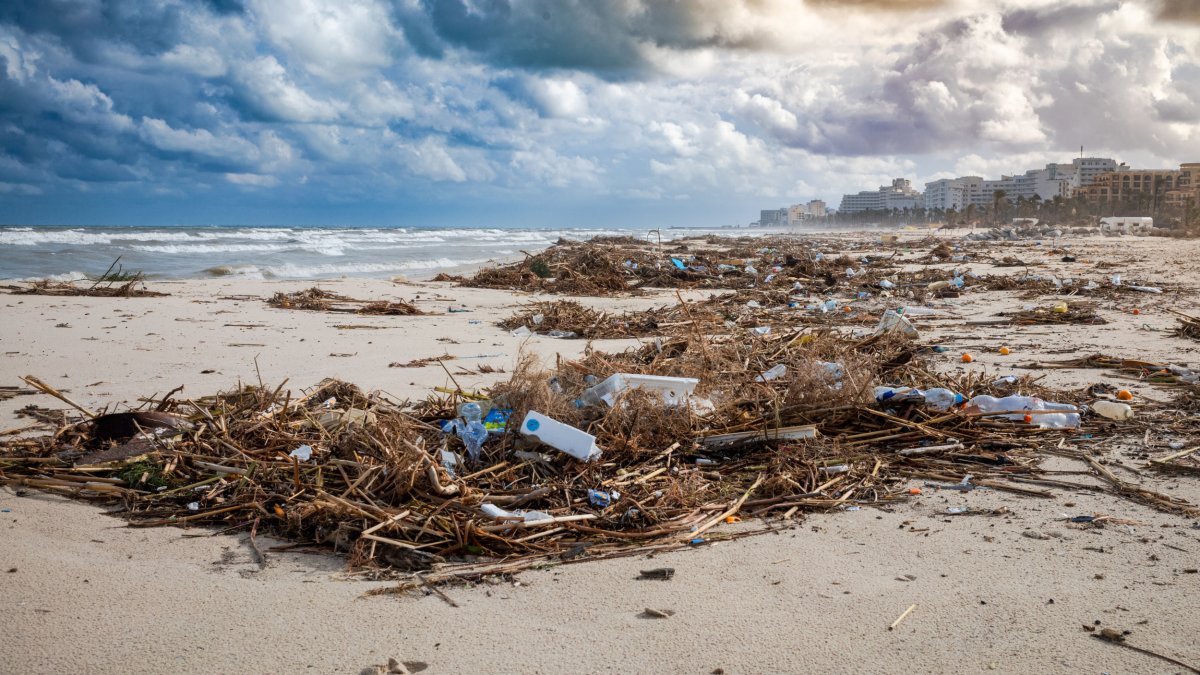When most people think of ocean plastic pollution, they think of what's visible—bottles washing up on shore, and grocery bags floating in the water. Far more insidious is the ever-growing presence of microplastics. The tiny pieces of plastic, invisible to the naked eye, are lurking in pristine-looking waters in even the most remote parts of the world. Microplastics, and increasingly nanoplastics, are affecting planet health, animal health, and human health. We are at a tipping point when it comes to plastic pollution, but we have a chance to turn the tide.
Right now, representatives from countries around the world are meeting in Ottawa, Canada, to advance negotiations of a treaty aimed at reducing plastic waste, known as INC-4. As conservationists, scientists, divers, partners in The Blue Paradox (a museum exhibit on the plastic pollution crisis), and as the concerned CEOs of Conservation International and SC Johnson we support the need for global action.
There is no denying that plastic has given us incredible modern advancements. From lightweight, durable packaging materials for everyday use to life-saving medical equipment, plastic has transformed our lives in positive ways. But plastic represents a significant global environmental challenge; about 11 million metric tons end up in the environment or oceans annually.

As divers, we've explored waters all over the world, and have tested for microplastic in the remotest of areas. From the Arctic to the southern tip of South America to the Sahara Desert, we've found microplastics. Microplastics, and increasingly even smaller pieces called nanoplastics, affect marine life in countless ways, even getting into our food chain. Given that seafood is the primary source of protein for about 3 billion people on our planet, this is cause for alarm. Studies have already found microplastics in our bodies!
To make progress at the pace we need, it takes regulation at both the country and international level to get all stakeholders in the plastic ecosystem working in concert to make effective progress at scale.
First, we support a global plastics treaty because some problems and solutions require a transnational approach. Oceans defy boundaries. Microplastics are found everywhere.
Second, having a strong waste collection infrastructure would greatly enhance efforts to keep plastic from going into the environment and the ocean. For those who are constrained by resources—we support financial and technical assistance, funded by developed countries, to assist developing nations to improve policies on waste management and the collection of waste before it flows into the oceans.
Third, we also need every country doing its part in developing strong national efforts through policies like Extended Producer Responsibility (EPR), and a legally binding treaty can ensure these policies are put into place. There are excellent examples of where regulation has worked, and recycling rates are high.
In Canada, the home of the INC-4 meetings, Quebec has had a form of EPR for almost 20 years and has high recycling and recovery rates. A key feature of Quebec's EPR program for containers, packaging, and printed paper includes eco-modulation and eco-design incentive bonus programs to spur more sustainable product and packaging designs. We also know it is important that national programs have awareness-raising and educational components to help us all understand what is at stake and the benefits of taking action.
We are at a tipping point. Plastic pollution is affecting planet, animal, and human health. We have hope that INC-4 stakeholders will take important steps toward solidifying a global treaty on plastic waste so we can start to turn the tide. They have our support.
Dr. Fisk Johnson is chairman and CEO of SC Johnson. SC Johnson is a global maker of household, personal care, baby care, and professional products. SC Johnson Brands include Windex®, OFF!®, Mr Muscle®, method®, Ecover®, and many others. Fisk is a passionate advocate for practical paths forward on sustainability issues, especially reducing plastic waste.
Dr. M. Sanjayan is a conservation scientist and chief executive officer of Conservation International, an organization working primarily in the Global South to secure nature for humanity. Sanjayan joined Conservation International in 2014 as executive vice president; he was named chief executive officer in 2017.
The views expressed in this article are the writers' own.
Uncommon Knowledge
Newsweek is committed to challenging conventional wisdom and finding connections in the search for common ground.
Newsweek is committed to challenging conventional wisdom and finding connections in the search for common ground.
About the writer
To read how Newsweek uses AI as a newsroom tool, Click here.








